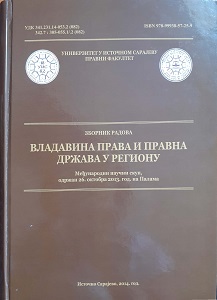Uticaj EU integracija na samostalnost-zavisnost domaće legislative (poseban osvrt na upravno pravo)
Influence of European Integration on (In)Dependence of National Legislation (Particular Case of the Administrative Law)
Author(s): Borče Davitkovski, Dragan Gocevski, Elena Davitkovska
Subject(s): EU-Approach / EU-Accession / EU-Development, EU-Legislation
Published by: Правни факултет Универзитета у Источном Сарајеву
Keywords: European administrative space;Acquise communitaire;Administrative procedure;Public and state administration;Principles of administrative procedure;
Summary/Abstract: When we speak of the “degree of dependence” or level of influence EU acts and agreements extend over national legislature, one must emphasize that this conditionality is above all voluntary. Member states and countries aspiring to EU membership strive to harmonize their laws and bylaws at a national level, in accordance to (mutually) determined directives, standards and recommendations adopted by the European Parliament and issued by the European Commission in the form of progress re-ports. In order to fully adapt to the founding values of the EU, all countries are driven to respect the common market and therefore follow the regulation adopted at supranational level by the legitimate EU institutions. Administrative law is no exception to this process of harmonization. Attempts to harmonize administrative legislature can be found in concepts such as European Administrative Space, Recommendations of the Council of Europe, partly in Agreements for Stabilization and Association (to the EU) and for the Western Balkans through Sigma. However, specifics of the national administrative systems were built and designed to serve the countries’ economic and political needs. Therefore, substantive legislative governing structure and institutions cannot be uniformed, and the Union indeed does not condition member states to adopt a uniformed administrative structure. Administrative procedural legislation, on the other hand is more convenient to such harmonizations and standardizing. Administrative procedure aims to protect the public (and EU) interest, as well as to protect the rights of parties in the procedure. In recent years there have been multiple attempts to adopt certain directions, recommendations and minimum of standards for administrative procedures at EU level as well as by the Council of Europe.Under the coordination and support from Sigma, states from the Western Balkan region, among which the Republic of Macedonia, have committed to reforming their administrative procedural laws. As a direct result, at the end of 2013 Macedonia adopted a Strategy for Reform of Law on General Administrative Procedure which aims to harmonize Macedonia’s administrative procedure with modern standards found in the EU.
- Page Range: 200-212
- Page Count: 13
- Publication Year: 2013
- Language: Serbian
- Content File-PDF

